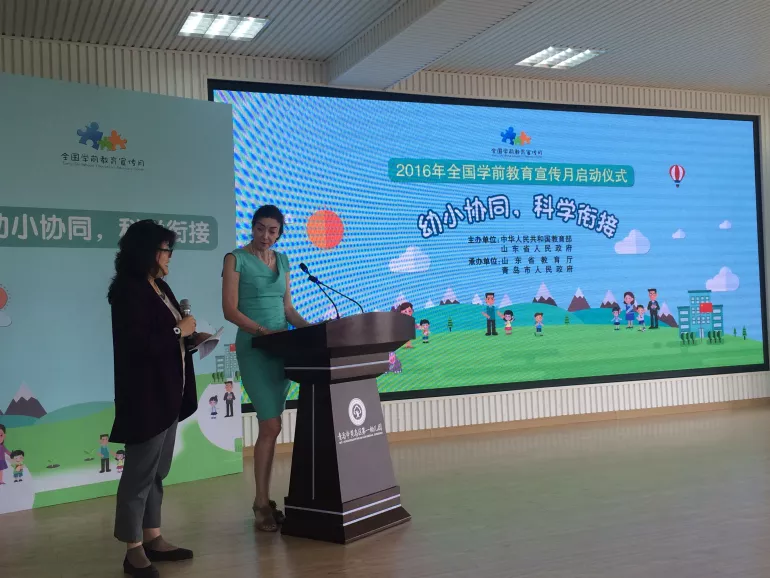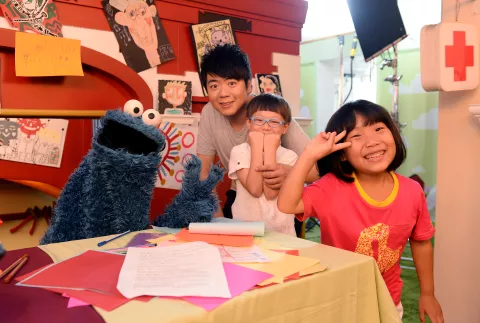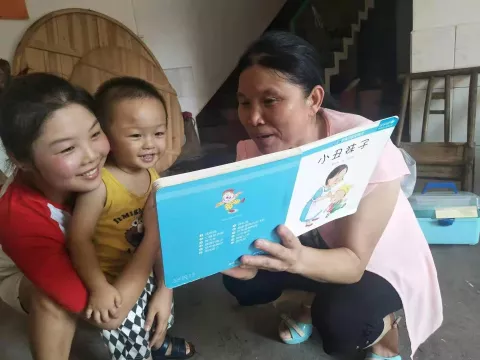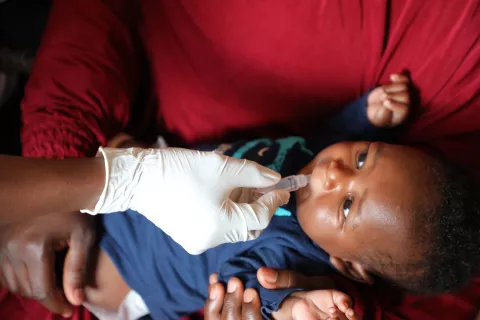Early childhood development: critical foundation for child's life-long learning
Fifth annual National Advocacy Month for ECD focuses on school readiness

- Available in:
- 中文
- English
Beijing, 20 May 2016 – As China initiates this year's National Advocacy Month for Early Childhood Development (ECD), with a focus on school readiness, UNICEF calls for continued investment in the first few years of a child's life as a key to adulthood wellbeing and success as well as building a peaceful, fair and prosperous society.
Global research shows that children who participate in early education programmes stay longer in schools, and are more likely to graduate from high school and be employed as adults. It is also proven to be an investment in economic growth. Evidence suggests that an additional dollar invested in quality ECD programmes yields a return of between $6 dollars and $17 dollars.
This year's National Advocacy Month for ECD, launched by the Ministry of Education (MOE), highlights how early childhood development is a critical investment in school readiness and the foundation for a child's lifelong learning. The focus is on how the country can better "coordinate the transition from kindergarten to primary schools" and ensure children are well equipped, cognitively, physically, emotionally, socially, and linguistically, before starting learning in school. For example, the development of pre-maths skills, such as comparing sizes of people, filling bottles with different amounts of water and matching objects, are critical to the development of mathematics skills in primary school.
"As a parent, we all want our children to be prepared for their first day of primary school. Being ready for school is much less about knowing their numbers or their alphabets and far more about what we can do as parents to ensure that their emotional, psychosocial, motor, and creative skills are developed and ready. When children arrive to school with a love of learning, a love of adventure and problem solving – they will quickly absorb the lessons on hand," said Rana Flowers, UNICEF Representative to China.
“The evidence is clear that if a child has benefited from early childhood development, where their curiosity and socialization skills are nurtured, they will thrive and learn more quickly. As parents we encourage these skills by reading to our children, by playing games, and making music, by climbing and exploring together. It sounds like fun? It is – but these are also the very steps that feed the child's brain and open the brain's compartments to learning”, Flowers said.
Prior to entering school, the family environment is the most important context for early childhood development. Supportive and responsive parenting practices are critical for children's cognitive, social and emotional development, and lay the foundations for success in school. Learning starts in home environment through parents' engagement with their children, telling stories, reading books, singing and playing games, as well as respective, patient and encouraging interactions. As a good example, reading stories develops children's vocabulary, imagination, special bond with parents, interest in learning to read when they go to school. It also nurtures children to learn about good manners, moral values and life skills.
Globally, school readiness is gaining currency as an important strategy to close the learning gap and improve equity in achieving lifelong learning. For children, especially the vulnerable and disadvantaged, including girls, children with disabilities, ethnic minorities and those living in rural areas, without early childhood development, entering the classroom for the first time to start primary school can be difficult and have an impact on how they succeed.
School readiness include three aspects – ready children, ready schools and ready families. It means all children should enter school with the social and cognitive skills and competencies to support their learning; schools are equipped and ready to help with the transition and have the right curriculum and teacher training in place to support; families and communities are ready to help their children make a smooth transition into school by supporting them emotionally as they experience the change.
In China, despite increased investment in early childhood development, often there is an abrupt shift in curriculum and teaching method between kindergartens and first grade at primary school, which makes it difficult for children to adjust to their new learning environment. Parents also often assume that their children should already know characters and how to count, which add to pressure of rote learning at a young age. This is developmentally inappropriate for young children, when instead this is an age of discovery and informal learning.
UNICEF echoed the MOE's call that a smooth transition for children needs coordinated efforts from kindergartens and schools, and that introducing primary school curriculum into kindergartens would do harm to children's development.
“UNICEF knows from global experience that the first semester is better used to help children navigate the transition, especially for those who were not able to access ECD services. Ultimately we want every child in China to benefit from this critical investment in the early years to make this transition smoother and their learning more effective.” said Flowers.
The Government of China is very cognisant of the importance of investing in ECD and committed to providing access to quality ECD to all children. Since the landmark decision outlined in 2010, to provide universal preschool education to children aged 3 to 6 years old by 2020, the ratio of children attending kindergartens increased from just 50.9 per cent in 2009 to 75 per cent by 2015.
In China, UNICEF is working closely with the Ministry of Education and its provincial and county education departments to improve the quality of ECD services with a special focus on the most disadvantaged children including those living in rural western regions and vulnerable children affected by population migration. Through the joint efforts with MOE counterparts, piloting a child-friendly kindergarten model has led to a package of standards and teacher training materials to support early learning and development, including a set of child-friendly kindergarten guidelines, and a storybook-based school readiness curriculum. The parenting portal and mobile application has been widely used by parents.
In addition to the national targets, there is now an ECD target included as part of the Sustainable Development Goals – the first time ECD has been explicitly included in global development goals. SDG Target 4.2 aims to increase the percentage of children under 5 years of age who are developmentally on track in health, learning and psychosocial well-being. Although ECD falls under the SDG for education, it provides a natural link to other goals, too — including poverty reduction, health and nutrition, women and girls' equality, and ending violence.
Note to Editors:
UNICEF China has launched a social media campaign since 2015, using the hashtags #童年怎样才美好# (how to have a happy childhood) and #做个好爸妈# (be a good parent). By now, it has attracted nearly 46 million page views and online comments on Sina Weibo.
Join the discussion:
Media contacts
About UNICEF
UNICEF works in some of the world's toughest places, to reach the world's most disadvantaged children. Across 190 countries and territories, we work for every child, everywhere, to build a better world for everyone. For more information about UNICEF and its work for children visit www.unicef.org.
| Visit UNICEF China website: www.unicef.cn Follow us on Sina Weibo: http://weibo.com/unicefchina Tencent Weibo: http://t.qq.com/unicef Wechat: unicefchina |





